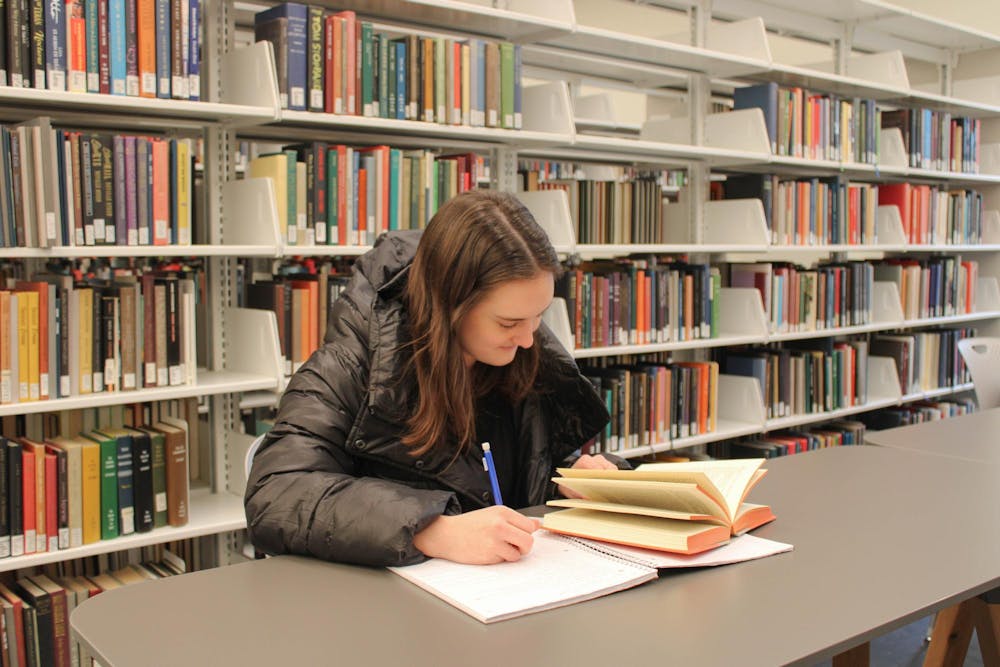While many students use laptops and tablets for class notes, an increasing number of professors are choosing to prohibit laptop use in the classroom or embrace full no-technology policies this semester which also ban tablets. While each iteration is slightly different depending on the professor, the goal is often the same — increasing student engagement and performance in the class.
Many professors have employed no-technology policies for years, but recently, students have observed a notable increase in the number of classes which employ these policies. In the summer of 2024, the University piloted a series of no-technology courses, called technology sabbaticals. These courses aimed to encourage student focus and increase engagement, and required students to spend free time, outside of class, without technology. Since then, more professors have been using no-technology policies in their courses.
At the University, the use of technology in the classroom is up to each professor’s discretion as long as their rules fall within the University’s IT guidelines on acceptable use, privacy and security. These no-technology policies vary across different courses, but many include prohibiting the use of laptops for note-taking and some extend the policy to all technology, including tablets. Professors with no-technology policies say they felt the need to make the change to stricter technology expectations because they have noticed a lack of focus and liveliness within the classroom.
Sylvia Chong, associate professor of English and American studies, is generally a pro-technology professor, as she utilizes various aspects of technology for activities in her smaller, discussion-based classes — which involve analyzing films and commenting on Google Docs and Slides as a class. However, she recently made a change in her technology policy in her larger AMST 3180, “Introduction to Asian American Studies” class. She noticed that students were not paying attention, making it difficult to teach.
“Many students shamelessly had their computers open and would never even look up, never even attempted to make eye contact and ask a question. I would stand next to them, and they would refuse to look up,” Chong said.
This is the first and only class so far that she has prohibited laptops in due to lack of engagement. While she is not sure how successful the policy will be, she hopes it increases engagement and the quality of learning in the classroom.
“Studies have shown that taking notes by hand is better than taking notes on a computer generally, because when you type, you're writing down literally everything that's being said,” Chong said. “By hand, you have to think more about what you're writing down. You have to pay attention more actively.”
Other professors have been using no-technology policies long before this semester. Asst. Public Policy Prof Peter Johannessen, began to enforce a no-laptop rule in his classroom nearly two and a half years ago. While Johannesen does not permit phones or laptops, he does allow tablets for writing notes in his classes because he thinks laptops are more distracting in large lecture-based classes.
Two things motivated him to make the change — a personal research project and a realization that students were not staying on task after seeing photos taken of his class.
Johannessen conducted his research project to evaluate how students felt they were valued in larger lecture courses at the University. Part of the project involved interviewing professors who have positive course evaluations — which students fill out at the end of each semester. Johannessen specifically focused on professors who were rated highly on a question about ability to create a sense of belonging in their courses. He found that almost all of these professors who he talked to had banned laptops in their classrooms.
“One thing which kept coming up across the interviews, which I was honestly fairly surprised by, was these professors just kept saying, ‘Oh yeah, and I'd ban laptops,’” Johannessen said. “I hadn't really thought of it, but the professors were fairly convinced that it was key to their courses’ success.”
Even after interviewing professors, Johannessen said he was not completely sure he would try to implement the policy in his own class. This was until a photographer came to one of his larger lectures after he won a teaching award, and he noticed, while looking through the pictures, the amount of laptops open that were not focused on classroom material.
“There was a sort of disengagement of people behind screens, looking at screens, rather than at each other or at the front of the room,” Johannessen said.
At the beginning of each term, Johannessen tends to face some challenges as a no-technology class is not something all students are familiar with — initially students tend to resist these policies as they are accustomed to using laptops for notes.
Johannessen also said that he believes the level of engagement and conversation that students have with each other is much higher than his classes from previous years. He noted that his course evaluations reflect this sentiment as this past semester they were the most positive they have ever been.
First-year College student Megan Catlander is currently in Johannessen’s LPPP 2200, “Introduction to Public Policy” class. She said that this is the first no-technology class she has ever taken at the University. While not a fan of the policy initially, she quickly found the experience to be transformative and after a few classes technology-free, she now plans to start going technology free in her economics class on her own volition.
“I found it to be a lot more collaborative … and we do a lot more face to face conversations which I learn the best in,” Catlander said. “I think everyone should take a technology free class.”
Still, the technology-free format may not be applicable or effective in all subjects.
First-year College student Claire Clark had a more negative experience in a technology-free art history course, ARTH 2451, “History of Modern Art.” This class was different from Johannessen’s as students were not allowed to use any type of technology, including tablets. Clark was frustrated, characterizing art history as a visual course, and often students like to take notes with a picture on either a tablet or a laptop.
“It’s hard to make everything handwritten when people need to have a visual comparison up for reference,” Clark said.
While some students find no-technology policies challenging for certain classes, several professors, even those in fields where technology is used more often, still believe these policies have been beneficial for their students. Asst. Media Studies Prof. Anna Clay continues to have a positive experience with a laptop-free classroom — even in a more technology-based subject like media studies.
Clay began a no-laptop policy in her classes nearly two years ago. She teaches three to four classes each semester, with 20 to 30 students. According to Clay, her classes are mostly discussion-based, and she noticed that laptops were a convenient way for students to become distracted and not be present in class.
Similar to Johannessen, some reactions were not initially positive. The first semester Clay established the policy, she had around six people drop her MDST 2690, “Sports Journalism” class, which was higher than the typical one or two students who drop the class, according to Clay.
Clay knows that students are already using technology frequently outside of the classroom. She believes that being at a liberal arts school is a great opportunity to learn and absorb information without technology. Clay said that she sees her class as an opportunity where students can be free of distraction for 75 minutes.
“It’s not that I don’t think the students are capable of learning. I just want to help them in the learning, in discussion, and in the processing,” Clay said. “Part of helping us all learn and grow is eliminating some of that distraction.”
Adjunct Politics Prof. Mary Kate Cary has also been a proponent of no-technology classes in both of her smaller speechwriting seminars and larger lecture-based classes since she started teaching at the University five years ago. She feels that laptops allow students to avoid human engagement and interaction in class.
While she is opposed to laptops in the classroom, she believes students should be able to use tablets to write because it has the same effect as writing on paper. According to Cary, when writing down notes as opposed to typing, students better process what they are writing, which more deeply engages the brain.
Cary explained that speechwriting is a collaborative and interactive class, saying she does not want her students to try and avoid being with each other by using technology.
“I had to keep telling students you cannot bring a laptop to the podium to deliver a speech, because then you are putting a shield up where the screen is between you and the audience,” Cary said.
To address concerns that some students with disabilities may struggle to keep up with notetaking without technology, Johannessen allows accommodations through the Student Disability Access Center, which promotes access for students with disabilities. According to Johannessen, some students with accommodations cannot record information in class by hand as quickly as they can on their computer. Students who have these accommodations can use their computers in class but in areas towards the back of the lecture hall that do not distract other students. SDAC also coordinates a program through which students can upload their notes for the class so that students with accommodations can access them.
Despite some students’ objections to no-technology policies, many have had positive experiences with moving towards handwritten notes. Catlander shared that she has adapted quickly to her professor’s no-technology policy and now appreciates putting away her laptop and phone during class.
“I initially was very surprised, and I didn't want to do it, because I've been very used to taking notes on my computer,” Catlander said. “But after the first class, it's actually so much better. It's become my favorite class here at U.Va., and I actually pay attention so much better ... so I love it a lot.”







